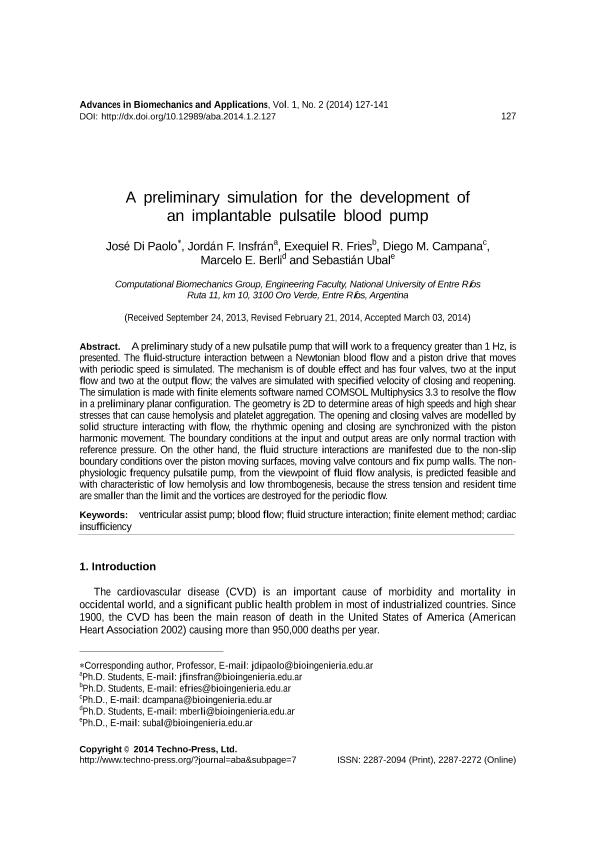Mostrar el registro sencillo del ítem
dc.contributor.author
Di Paolo, Jose
dc.contributor.author
Insfrán, Jordán Francisco

dc.contributor.author
Fries, Exequiel R.
dc.contributor.author
Campana, Diego Martin

dc.contributor.author
Berli, Marcelo Eduardo

dc.contributor.author
Ubal, Sebastian

dc.date.available
2016-12-12T20:50:24Z
dc.date.issued
2014-06
dc.identifier.citation
Di Paolo, Jose; Insfrán, Jordán Francisco; Fries, Exequiel R.; Campana, Diego Martin; Berli, Marcelo Eduardo; et al.; A preliminary simulation for the development of an implantable pulsatile blood pump; Techno-press; Advances in Biomechanics and Applications; 1; 2; 6-2014; 127-141
dc.identifier.issn
2287-2094
dc.identifier.uri
http://hdl.handle.net/11336/9190
dc.description.abstract
A preliminary study of a new pulsatile pump, that will work to a frequency greater than 1 Hz, is presented. The fluid-structure interaction between a Newtonian blood flow and a piston drive that moves with periodic speed is simulated. The mechanism is of double effect and has four valves, two at the input flow and two at the output flow; the valves are simulated with specified velocity of closing and reopening. The simulation is made with a finite elements software named COMSOL Multiphysics 3.3 to resolve the flow in a preliminary planar configuration. The geometry is 2D to determine areas of high speeds and high shear stresses that can cause hemolysis and platelet aggregation. The opening and closing valves are modelled by solid structure interacting with flow, the rhythmic opening and closing are synchronized with the piston harmonic movement. The boundary conditions at the input and output areas are only normal traction with reference pressure. On the other hand, the fluid structure interactions are manifested due to the non-slip boundary conditions over the piston moving surfaces, moving valve contours and fix pump walls. The non-physiologic frequency pulsatile pump, from the viewpoint of fluid flow analysis, is predicted feasible and with characteristic of low hemolysis and low thrombogenesis, because the stress tension and resident time are smaller than the limit and the vortices are destroyed for the periodic flow.
dc.format
application/pdf
dc.language.iso
eng
dc.publisher
Techno-press

dc.rights
info:eu-repo/semantics/openAccess
dc.rights.uri
https://creativecommons.org/licenses/by-nc-sa/2.5/ar/
dc.subject
Ventricular Assist Pump
dc.subject
Blood Flow
dc.subject
Fluid Structure Interaction
dc.subject
Finite Element Method
dc.subject
Cardiac Insufficiency
dc.subject.classification
Ingeniería Médica

dc.subject.classification
Ingeniería Médica

dc.subject.classification
INGENIERÍAS Y TECNOLOGÍAS

dc.title
A preliminary simulation for the development of an implantable pulsatile blood pump
dc.type
info:eu-repo/semantics/article
dc.type
info:ar-repo/semantics/artículo
dc.type
info:eu-repo/semantics/publishedVersion
dc.date.updated
2016-12-12T14:19:54Z
dc.journal.volume
1
dc.journal.number
2
dc.journal.pagination
127-141
dc.journal.pais
Corea del Sur

dc.description.fil
Fil: Di Paolo, Jose. Universidad Nacional de Entre Ríos. Facultad de Ingeniería. Departamento de Física Química. Laboratorio de Biomecánica Computacional; Argentina
dc.description.fil
Fil: Insfrán, Jordán Francisco. Universidad Nacional de Entre Ríos. Facultad de Ingeniería. Departamento de Física Química. Laboratorio de Biomecánica Computacional; Argentina. Consejo Nacional de Investigaciones Científicas y Técnicas; Argentina
dc.description.fil
Fil: Fries, Exequiel R.. Universidad Nacional de Entre Ríos. Facultad de Ingeniería. Departamento de Física Química. Laboratorio de Biomecánica Computacional; Argentina
dc.description.fil
Fil: Campana, Diego Martin. Universidad Nacional de Entre Ríos. Facultad de Ingeniería. Departamento de Física Química. Laboratorio de Biomecánica Computacional; Argentina. Consejo Nacional de Investigaciones Científicas y Técnicas; Argentina
dc.description.fil
Fil: Berli, Marcelo Eduardo. Consejo Nacional de Investigaciones Científicas y Técnicas. Centro Científico Tecnológico Santa Fe. Instituto de Desarrollo Tecnológico para la Industria Química (i); Argentina. Universidad Nacional de Entre Ríos. Facultad de Ingeniería. Departamento de Física Química. Laboratorio de Biomecánica Computacional; Argentina
dc.description.fil
Fil: Ubal, Sebastian. Consejo Nacional de Investigaciones Científicas y Técnicas. Centro Científico Tecnológico Santa Fe. Instituto de Desarrollo Tecnológico para la Industria Química (i); Argentina. Universidad Nacional de Entre Ríos. Facultad de Ingeniería. Departamento de Física Química. Laboratorio de Biomecánica Computacional; Argentina
dc.journal.title
Advances in Biomechanics and Applications
dc.relation.alternativeid
info:eu-repo/semantics/altIdentifier/url/http://technopress.kaist.ac.kr/?page=container&journal=aba&volume=1&num=2
dc.relation.alternativeid
info:eu-repo/semantics/altIdentifier/doi/http://dx.doi.org/10.12989/aba.2014.1.2.127
Archivos asociados
